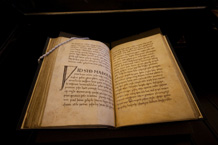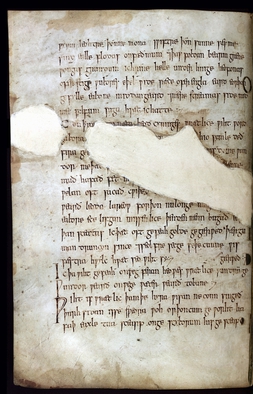| Folios | Solutions (1-88 Riddle Ages, 89-95 Baum unless otherwise stated) | Numbering |
|---|
(Krapp and
Dobbie) | (Williamson) | (Baum) |
|---|
| 101r | Storm, Wind, etc. | 1 | 1a | 1 |
| 101r | Storm, Wind, etc. | 2 | 1b | 2 |
| 101v-102v | Storm, Wind, etc. | 3 | 1c | |
| 102v | Bell (most widely supported), [19] Bucket, Plough-team, etc. | 4 | 2 | 35 |
| 102v | Shield (most widely supported), Chopping Block, Guilt | 5 | 3 | 49 |
| 102v-103r | Sun | 6 | 4 | 17 |
| 103r | Swan | 7 | 5 | 21 |
| 103r | Nightingale (likely), Pipe or Flute, all manner of other birds, etc. | 8 | 6 | 22 |
| 103r-v | Cuckoo | 9 | 7 | 20 |
| 103v | Barnacle Goose | 10 | 8 | 23 |
| 103v | Wine or Cup of Wine | 11 | 9 | 18 |
| 103v-104r | Ox, Ox-hide, Leather (object), etc. | 12 | 10 | 24 |
| 104r | Flock of sheep, [20] ten chickens (this is the generally accepted one), ten pheasants, butterfly cocoon, alphabet, moth, fingers and gloves | 13 | 11 | 28 |
| 104r | Horn | 14 | 12 | 53 |
| 104v | Badger, Fox, Porcupine, Hedgehog, Weasel | 15 | 13 | 29 |
| 104v-105r | Anchor | 16 | 14 | 57 |
| 105r | Ballista, Fortress, Quiver, Bee-skep, etc. | 17 | 15 | 52 |
| 105r | Jug, Amphora, Cask, Leather bottle, Inkhorn, Phallus | 18 | 16 | |
| 105r | Ship, Falconry/Horseman and hawk [sometimes with wagon/servant] and Writing | 19 | 17 | 71 |
| 105r-105v | Sword, Falcon/Hawk, Phallus | 20 | 18 | 51 |
| 106r | Plough | 21 | 19 | 32 |
| 106r-106v | Ursa Major, (days of the) month, bridge, New Year, stars | 22 | 20 | 63 |
| 106v | Bow | 23 | 21 | 46 |
| 106v | Jay, Magpie, Woodpecker | 24 | 22 | 69 |
| 106v-107r | Onion, leek, mustard, phallus, etc. | 25 | 23 | 76 |
| 107r-107v | Book, Bible, Gospel Book | 26 | 24 | 43 |
| 107v | Mead, Whip, Sleep | 27 | 25 | 59 |
| 107v | John Barleycorn, Wine cask, Beer, Ale, Mead, Harp, Stringed instrument, Tortoise lyre, Yew horn, Barrow, Trial of soul, Pattern-welded sword, Parchment, Biblical codex | 28 | 26 | 60 |
| 107v-108r | Sun and moon, swallow and sparrow, cloud and wind, bird and wind | 29 | 27 | 3 |
| 108r | Beam, Cross, Wood, Tree, Snowflake | 30 a and b | 28 a and b | 14 |
| 108r-108v | Psaltery and Quill-pick, Quill-pen and Fingers, Bagpipe, Fiddle, Portable Organ, Organistrum, Harp, Cithara | 31 | 29 | 44 |
| 108v | Ship, Wagon, Millstone, Wheel, Wheelbarrow | 32 | 30 | 58 |
| 108v-109r | Iceberg, Ice, Ice-floe | 33 | 31 | 6 |
| 109r | Rake | 34 | 32 | 31 |
| 109r-109v | Mail-coat (i.e. armour) | 35 | 33 | 50 |
| 109v | Ship; Man woman horse; Two men, woman, horses, dog, bird on ship; Waterfowl hunt; Pregnant horse, two pregnant women; Hunting; Sow and five piglets | 36 | 34 | 73 |
| 109v | Bellows, Wagon | 37 | 35 | 81 |
| 109v | (Young) Ox, Bullock | 38 | 36 | 26 |
| 109v-110r | Dream, Death, Cloud, Speech, Faith, Day, Moon, Time, Comet | 39 | 37 | 4 |
| 110r-111v | Creation | 40 | 38 | 11 |
| 112r | Water, Wisdom, Creation | 41 | 39 | |
| 112r | N N Æ A A H H = hana & hæn, or Cock and Hen | 42 | 40 | 70 |
| 112r-112v | Soul and Body | 43 | 41 | 10 |
| 112v | Key and lock, Phallus, Dagger sheath | 44 | 42 | 75 |
| 112v | Dough | 45 | 43 | 77 |
| 112v | Lot and his Daughters | 46 | 44 | 64 |
| 112v-113r | Book-worm, Book-moth, Maggot and psalter | 47 | 45 | 42 |
| 113r | Paten, Chalice, Sacramental vessel | 48 | 46 | 15 |
| 113r | Oven, Beehive, Falcon Cage, (Book)case, Pen and ink, Barrow, Sacrificial altar, Millpond and sluice | 49 | 47 | 38 |
| 113r | Fire, Anger, Dog | 50 | 48 | 8 |
| 113r-113v | Pen and fingers | 51 | 49 | 40 |
| 113v | Buckets, Broom, Flail, Yoked oxen | 52 | 50 | 66 |
| 113v | Battering Ram is the most common solution, but Cross and Gallows have also been suggested | 53 | 51 | 47 |
| 113v-114r | Butter churn, Baker's boy and oven | 54 | 52 | 78 |
| 114r | Shield, Scabbard, Harp, Cross, Gallows, Sword rack, Sword box, Hengen | 55 | 53 | 13 |
| 114r | Loom, Lathe | 56 | 54 | 37 |
| 114r-114v | Swifts, Swallows, Crows, Jackdaws, Starlings, House martins, Letters, Musical notes, Gnats, Stormclouds, Hailstones, Raindrops, Bees, Midges, Damned souls, or Demons | 57 | 55 | 19 |
| 114v | Well-sweep | 58 | 56 | 34 |
| 114v-115r | Chalice | 59 | 57 | 16 |
| 122v-123r | Reed (pen), Rune staff | 60 | 58 | 41 |
| 124v | Shirt/Kirtle/Tunic, Garment, Helmet | 61 | 59 | 79 |
| 124v-125r | Poker, Boring tool, Phallus | 62 | 60 | 80 |
| 125r | Glass beaker, Flask, Flute | 63 | 61 | 84 |
| 125r | Man on horseback; falconry; ship; scribe; writing | 64 | 62 | 72 |
| 125r | Onion, Leek, Chives | 65 | 63 | 39 |
| 125r-125v | Creation, God | 66 | 64 | 12 |
| 125v | Bible, Religious Book | 67 | 65 | |
| 125v | Ice, Iceberg, Icicle, Frozen Pond | 68, 69 | 66 | 7 |
| 125v-126r | (Church) Bell, Shawm/Shepherd's Pipe, (Double) Flute, Harp, Lyre, Organistrum, Shuttle; Lines 5-6 as a separate riddle: Lighthouse, Candle | 70 | 67, 68 | 45 |
| 126r | Cupping-glass, Iron Helmet, Iron Shield, Bronze Shield, Sword or Dagger, Sword-hilt, Iron Ore, Retainer | 71 | 69 | |
| 126r | Ox, Heifer, Cow | 72 | 70 | 25 |
| 126r-126v | Spear, bow, cross | 73 | 71 | 48 |
| 126v | Cuttlefish, Boat and oak, Quill pen, Ship's figurehead, Siren, Water | 74 | 72 | 67 |
| 127r | Hound, Piss, Hound and Hind, Christ | 75, 76 | 73 | 74, 27 |
| 127r | Oyster | 77 | 74 | 30 |
| 127r | Crab, Oyster, Fish, Lamprey | 78 | 75 | |
| 127r | Horn, Falcon, Hawk, Spear, Sword, Scabbard | 79, 80 | 76 | 54 |
| 127v | Weathercock, Ship, Visored helmet | 81 | 77 | 36 |
| 127v | Crab, harrow | 82 | 78 | |
| 127v | Ore; metal; gold; coins; revenant; spirit | 83 | 79 | 9 |
| 127v-128v | Water | 84 | 80 | 5 |
| 128v | Fish and River, Body and Soul | 85 | 81 | 62 |
| 128v-129r | One-eyed Seller of Garlic | 86 | 82 | 61 |
| 129r-129v | Bellows | 87 | 83 | |
| 129v | Antler, Inkhorn, Horn, Body and Soul | 88 | 84, 85 | 55 |
| 129v | ? | 89 | 86 | |
| 129v | ? (a Latin text, arguably not actually a riddle) [21] | 90 | | |
| 129v-130r | Key | 91 | 87 | 33 |
| 130r | ? | 92 | 88 | |
| 130r | Inkhorn | 93 | 89 | 56 |
| 130r-130v | Creation | 94 | 90 | |
| 130v | The sun; [22] jay, magpie? | 95 | 91 | 68 |




